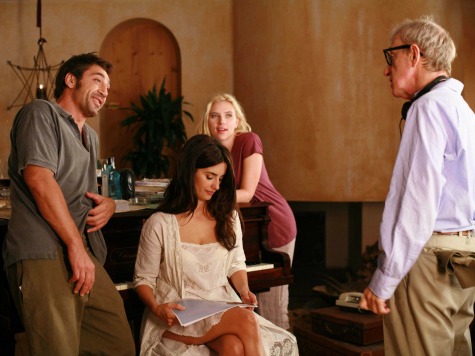
Woody Allen and Mia Farrow’s daughter Dylan Farrow made public a personal account of a harrowing story this week. In a letter to the New York Times, she detailed how Allen repeatedly molested her at age 7, and asked actors who worked with him to speak out.
Farrow’s call has received radio silence from Hollywood.Farrow recounts in the letter the abuse she allegedly suffered at the hands of Allen. These are not light allegations, nor is the account anything but painful to read.
She says she remembers staring at a toy train making circles on a track while Allen sexually assaulted her.She also notes that she feels abandoned by Hollywood: “that torment was made worse by Hollywood. All but a precious few (my heroes) turned a blind eye. Most found it easier to accept the ambiguity.”
Allen’s attorney denied the allegations, blaming Mia Farrow for their reemergence. “It is tragic that after 20 years a story engineered by a vengeful lover resurfaces after it was fully vetted and rejected by independent authorities,” he said in a statement to Mother Jones.
Farrow ends her letter with a very important message to Allen’s peers in Hollywood, one which has mostly fallen on deaf ears:
What if it had been your child, Cate Blanchett? Louis CK? Alec Baldwin? What if it had been you, Emma Stone? Or you, Scarlett Johansson? You knew me when I was a little girl, Diane Keaton. Have you forgotten me? Woody Allen is a living testament to the way our society fails the survivors of sexual assault and abuse.
Blanchett, who appeared in Allen’s film Blue Jasmine this year, released a short and distant statement: “It’s obviously been a long and painful situation for the family and I hope they find some resolution and peace.” Alec Baldwin responded on Twitter with a non-response: “You are mistaken if you think there is a place for me, or any outsider, in this family’s issue.” None of the others who have worked with Allen have responded at press time, though Keaton has spoken publicly about Allen: at an homage to his name at this year’s Golden Globes. One unrequested response was that of Girls star Lena Dunham, who called the letter “courageous, powerful, and generous.”
Dunham aside, the silence from many in Hollywood upon hearing such vile allegations speaks volumes, and puts on display the worst of that community’s rape culture. As defined in one article in the progressive magazine The Nation, rape culture consists of the “tacit acceptance of misogyny in everything from casual conversations with our peers to the media we consume… accept[ing] the degradation of women and posit[ing] uncontrollable hyper-sexuality of men as the norm.” This definition is limited: the victims of rape need not be women, and rapists need not be conventionally “hyper-sexual.”
Rape culture is typically attached by the left to the so-called Republican “war on women,” brought up whenever a low-ranking conservative public figure says a pro-life statement or an unpopular but convenient extremist attempts to publicly understand rape without being asked. To describe any throwaway political remark in such a way cheapens the definition in a way that benefits people like Allen.
In rape culture, the victim is always suspect and the rapist is always one exoneration away from being a victim himself (and it is almost always himself). Sure, the cases of an actual vocal defense of Allen for such heinous crimes are few and far between. The Daily Beast has the ignoble distinction of publishing the most repulsive one, defending Allen from the “the two-headed piranha of gossip and innuendo,” launching an irrelevant attack on Mia Farrow for “fooling around” with Frank Sinatra, and floating the idea that Dylan Farrow was “coached” into such a heinous lie. But the silence from Allen’s peers speaks even louder than this vocal defense.
But those who praise Allen unconditionally–like those Farrow lists in her letter–further the idea that only Allen’s career matters, and Dylan Farrow’s life and personal integrity have no value compared to a DVD of Annie Hall. To ignore such a violation of a child is to disregard the suffering of all victims of abuse, to tell the children silently agonizing that even if they speak up, no one will listen if their predators are funny enough, or well-connected enough, or can tell a good story.
Whether the allegations are ever proven true or not doesn’t matter, because the problem is that they are not being taken seriously for a frivolous reason: people like Allen’s films. For a community that prides itself on its allegedly progressive nature, such a flippant attitude towards rape is unwelcoming, disingenuous and immoral.

COMMENTS
Please let us know if you're having issues with commenting.